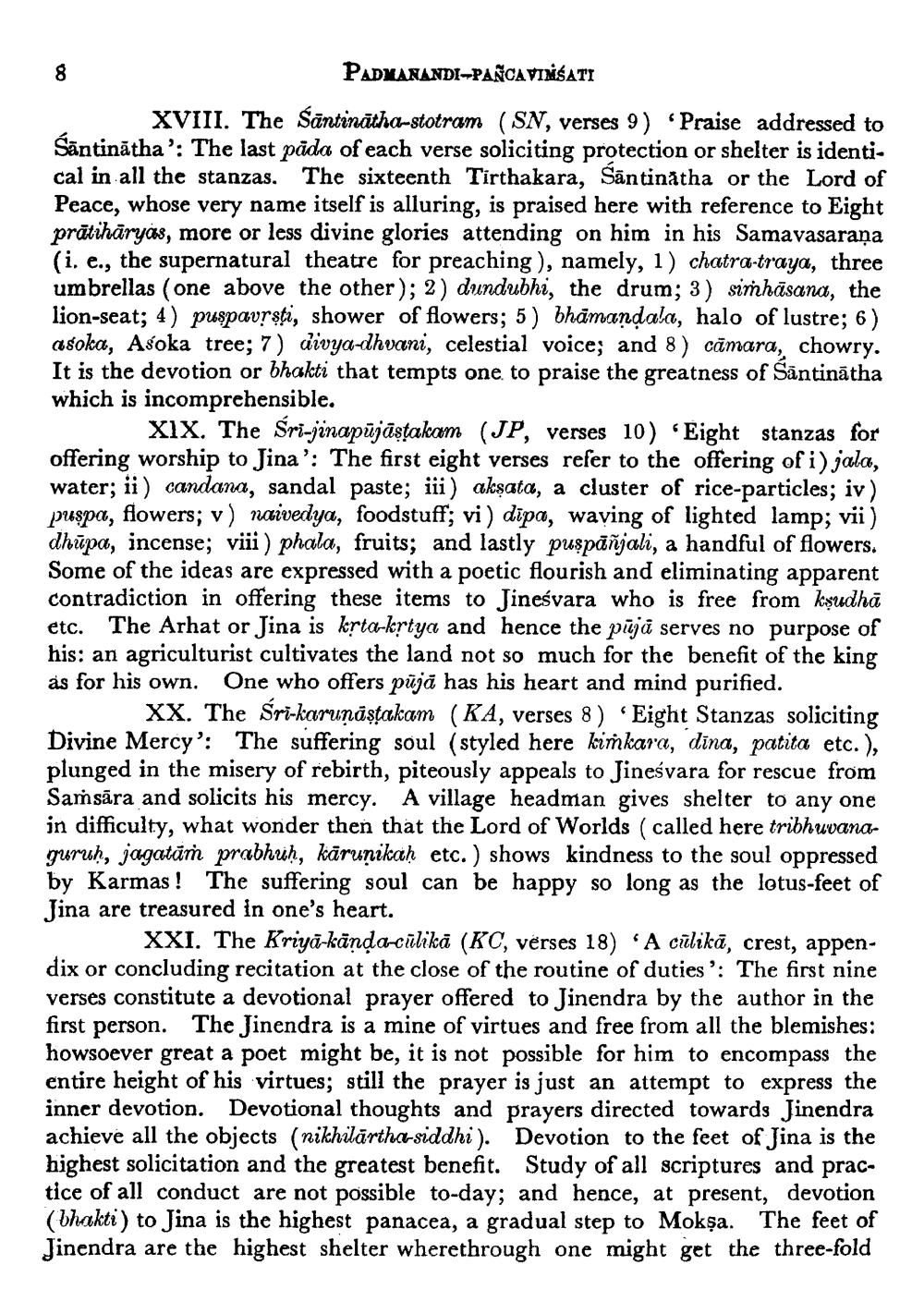________________
PADMANANDI-PARCAVIRŠATI
XVIII. The śāntinātha-stotram (SN, verses 9) Praise addressed to Säntinātha': The last päda of each verse soliciting protection or shelter is identical in all the stanzas. The sixteenth Tirthakara, śāntinātha or the Lord of Peace, whose very name itself is alluring, is praised here with reference to Eight prātihāryas, more or less divine glories attending on him in his Samavasarana (i. e., the supernatural theatre for preaching ), namely, 1) chatra-traya, three umbrellas (one above the other); 2) dundubhi, the drum; 3) simhāsand, the lion-seat; 4) puspavssti, shower of flowers; 5) bhāmandala, halo of lustre; 6) asoka, Asoka tree; 7) divyadhvani, celestial voice; and 8) câmara, chowry. It is the devotion or bhakti that tempts one to praise the greatness of Säntinātha which is incomprehensible.
XIX. The Sri-jinapūjāstakom (JP, verses 10) 'Eight stanzas for offering worship to Jina': The first eight verses refer to the offering of i) jala, water; ii) candana, sandal paste; iii) aksata, a cluster of rice-particles; iv) puspa, flowers; v) naivedya, foodstuff; vi) dipa, waving of lighted lamp; vii) dhūpa, incense; viii) phala, fruits; and lastly puspāñjali, a handful of flowers. Some of the ideas are expressed with a poetic flourish and eliminating apparent contradiction in offering these items to Jineśvara who is free from ksudhā etc. The Arhat or Jina is krta-krtya and hence the pūjā serves no purpose of his: an agriculturist cultivates the land not so much for the benefit of the king as for his own. One who offers pājā has his heart and mind purified.
XX. The Sri-karunāstakam (KA, verses 8) 'Eight Stanzas soliciting Divine Mercy': The suffering soul (styled here kimkara, dina, patita etc.), plunged in the misery of rebirth, piteously appeals to Jinesvara for rescue from Saṁsāra and solicits his mercy. A village headman gives shelter to any one in difficulty, what wonder then that the Lord of Worlds ( called here tribhuvanaguruḥ, jagatām prabhuḥ, kārunikaḥ etc.) shows kindness to the soul oppressed by Karmas ! The suffering soul can be happy so long as the lotus-feet of Jina are treasured in one's heart.
XXI. The Kriyā-kānda-cūlikā (KC, verses 18) 'A cūlikā, crest, appendix or concluding recitation at the close of the routine of duties ’: The first nine verses constitute a devotional prayer offered to Jinendra by the author in the first person. The Jinendra is a mine of virtues and free from all the blemishes: howsoever great a poet might be, it is not possible for him to encompass the entire height of his virtues; still the prayer is just an attempt to express the inner devotion. Devotional thoughts and prayers directed towards Jinendra achieve all the objects (nikhilārtha siddhi). Devotion to the feet of Jina is the highest solicitation and the greatest benefit. Study of all scriptures and practice of all conduct are not possible to-day; and hence, at present, devotion (bhakti) to Jina is the highest panacea, a gradual step to Mokşa. The feet of Jinendra are the highest shelter wherethrough one might get the three-fold




